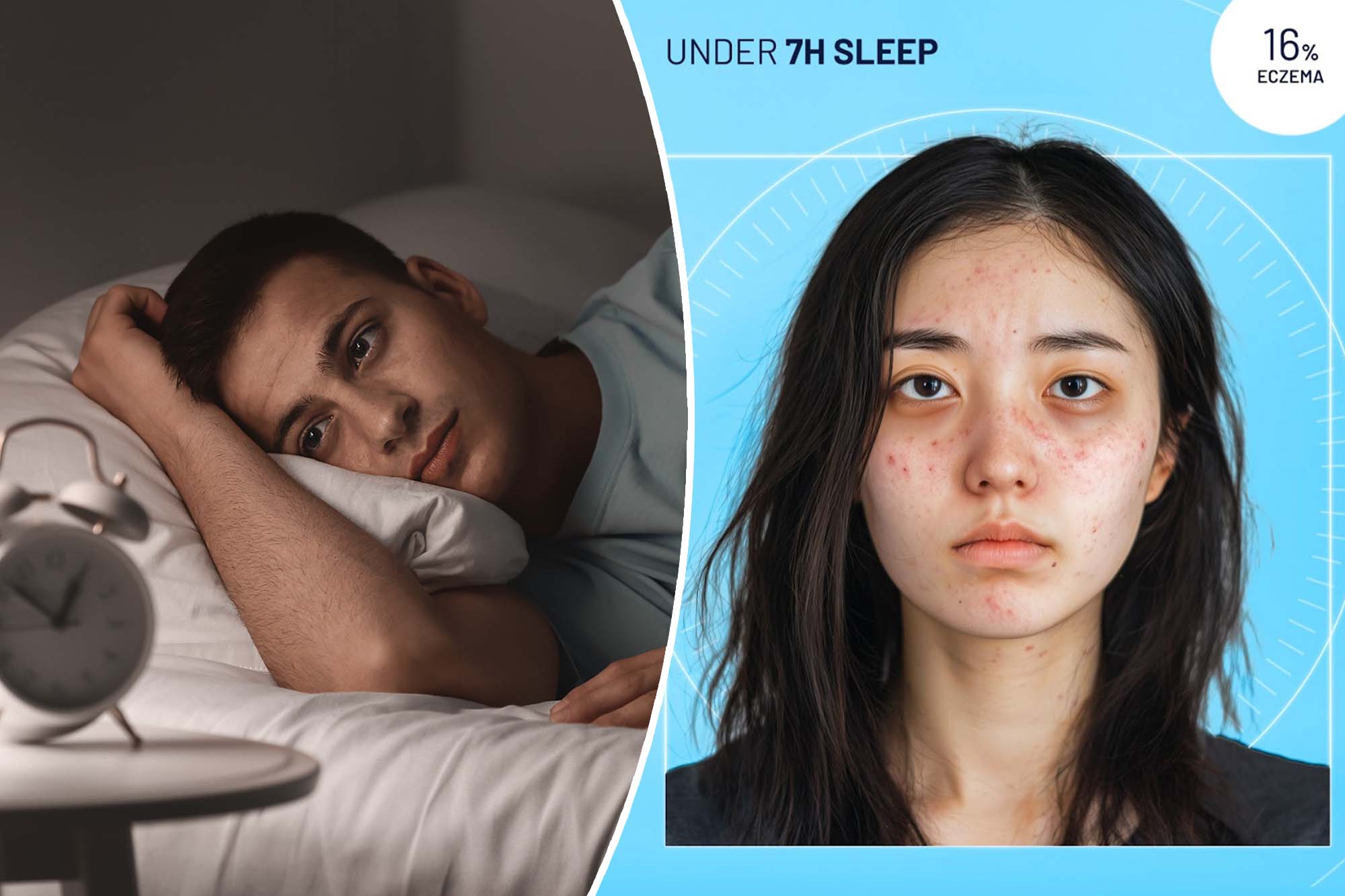
Beauty buffs, note: your sleep routine may need a serious makeover.
From dull, unclear to bloating, a new study by Sleep Sleep Schleep Technology reveals the startling effects not to rest enough on both your appearance and overall health.
“Lack of sleep leaves you tired alone – it appears all over your body,” said Lisa Art, Deputy Director General of Simba Charity Partner, sleep charity.
Skin fighting
Simba study of 2,175 adults across the UK found that more than 60% of people are not taking seven hours recommended every night, with women who were the hardest hit.
Participants were also asked about their physical health and appearance, and Simba used artificial intelligence to visualize the impact of inadequate rest.
They found that the skin is one of the first places to show the effects of sleepless nights. Among women, 28% reported sensitive skin as they were constantly absent from sleep, compared to only 17% of men. Other complaints included fragile nails, uneven skin tone and an incorrect complexion.
“At night, the skin works overtime to regenerate and repair itself,” Artician explained. “When sleep is compromised, lowering blood flow makes the skin appear calm and lack vibrancy, stripping it of its natural shine and vibrancy.”
Even worse, sleep deprivation can promote cortisol level – body stress hormone – worsening inflammatory skin conditions such as eczema and psoriasis, causing redness, irritation and itching.
Simba study found that people aged 35 to 44 experienced the most noticeable effects, with nearly half of the reporting more eczema on their faces. Meanwhile, 70% of those aged 18 to 34 noticed adult facial dermatitis, and over half of this group reported psoriasis in their wings.
Weight
The study also identified a link between sleep deprivation and weight gain.
Near seven in ten participants with a body of body (BMI) in the thick category reported to sleep less than seven hours a night, compared to 44% of those in the healthy weights and 55% of those in the underweight category .
Simba also found that 79% of those who slept less than seven hours a night noted increased fat deposits around their abdomen – a sustainable trend in both sexes.
“During sleep, the body balances hormones like grrelin and leptin, which control hunger and saturation. Without adequate rest, Grrelin’s levels promote, making people feel more hungry, while leptin levels decrease, reducing the sense of fullness, “Arthus said.
This imbalance can lead to late night snacking, especially for sugar, high -calorie foods. The study found that women are more likely to enjoy these desires than men, often turning into food as a way to cope with stress.
Sleep deprivation also affects fat storage hormones, contributing to weight gain patterns that vary between sexes. “Women are more likely to see increased fat in the hips and thighs due to hormonal changes, while men may notice more abdominal fat due to lower testosterone levels,” Art said.
Bloating battle
Liquid maintenance and swelling were also common consequences for not getting enough eyes.
In the study, about 36% of sleep deprived women complained of bloating compared to half of men. Similarly, 15% of women suffered swollen ankle – nearly three times the number of men reporting the same issue.
Researchers believe this is caused by the impact of sleep deprivation on the release of vasopressin, a hormone that regulates the expulsion of water to the body, leading to that swollen appearance.
Chronic lack of sleep can also damage the kidney function, making it more difficult for the body to manage water levels effectively.
“For women, the level of hormone fluctuation during menstrual cycles and menopause can intensify this fluid construction,” Arti said. “Men, on the other hand, may suffer swelling as a result of compromised cardiovascular health, which may be exacerbated by lack of sleep.”
The biggest picture
Sleep deprivation is not just by wreaking havoc for your appearance – it is affecting your whole body.
Simba study found that 34% of women and 18% of men reported cold legs, while 27% of women also suffered cold hands.
“Body temperature is also under circadian control,” Art said. “Loss of sleep can damage the body’s ability to manage and regulate its internal temperature, causing fluctuations and discomfort in the hands and other extremities.”
Loss of sleep has been associated with a number of chronic health problems, including heart disease, kidney disease, high blood pressure, diabetes and stroke. Connected also associated with damaged memory and mood swings.
According to centers for disease control and prevention, about 1 in 3 adults American do not get enough sleep daily. About 50 to 70 million Americans suffer from chronic sleep disorders.
Even more alarming? Nearly 40% of adults report falling asleep inadvertently during the day at least once a month – often leading to tragic accidents. In fact, the research suggests that about 17% of the fatal car clashes in the JBA include a sleepy driver.
#making #sleep #appearance
Image Source : nypost.com